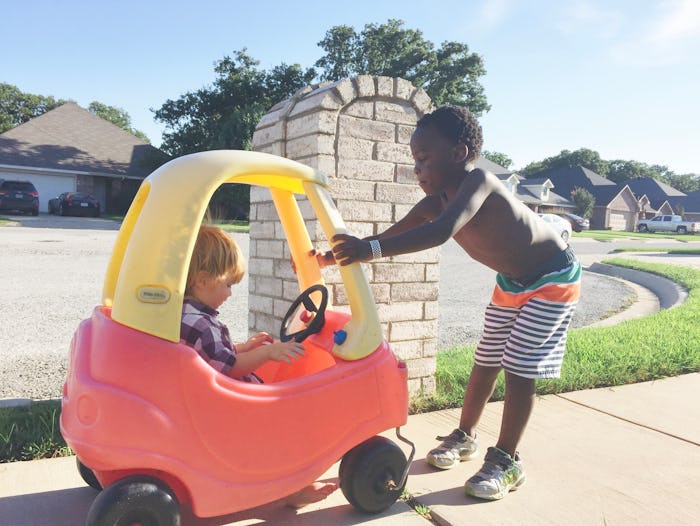Life

They're Classics For A Reason — Here Are 10 Toys An Expert Says Every Kid Needs
Raising kids in a postmodern society means our families are constantly inundated with technology. As screens of various sizes overwhelm our lives, its easy to get swept away in their convenience. But as helpful as computers can be for growing minds, they can never provide all of the developmental skills that children need to thrive mentally, socially, emotionally, or physically. Those skills are honed only through good old fashioned, hands-on play. Although there have been incredible advances in the toy industry, many of the best playthings are the oldest, and there are a few classic toys every kid should have. Lee Scott is a curriculum development and supplemental education specialist and serves on The Goddard School Educational Advisory Board. Passionate about toys and play, Scott tells Romper, "Toys and games should keep children engaged and maintain their interest over time. Toymakers and game creators from years past knew this, and there are quite a few classic toys and games that are still very relevant today."
Contrary to our assumption that kids want to be passively entertained, Scott has found, "The key is that the child can be creative, learn something new, build on learned skills as they play and, most of all, have a lot of fun. Toys that just entertain are those that end up sitting in the toy box or on a shelf." Here are Scott's top classic toy picks for kids.
1Wooden Blocks
"Wooden blocks are great for innovation and dramatic play as well as developing engineering and critical thinking skills," Scott says. Best of all, the sky is the limit for where their imagination can go.
2Board Games
"Taking turns, counting, and vocabulary development are just some of the skills children build when playing simple board games. Get out the classics such as Candy Land, UNO for Juniors, and Chutes and Ladders. Prepare for lots of giggles," she suggests.
3Puzzles
I mean, the ultimate quiet toy, right? "Puzzles are a great way for children to learn to take turns and solve a problem together," Scott explains to parents. "As children work on the puzzles, they develop self-regulation and concentration skills."
4Balls
We all know how much little bodies need fresh air and sunshine. "Collect different sizes of balls and practice kicking, throwing, and bouncing," Scott suggests.
5Jump Ropes
"Jumping rope is terrific for developing gross motor skills and balance," Scott says. While very young children might easily get frustrated with the coordination required for jump rope, kindergarteners and up tend to love the activity.
6Modeling Clay
"Nothing is better than modeling clay or play dough. Learning to sculpt with clay or play dough also taps into creativity, artistic expression, and strategic thinking," she explains.
7Musical Instruments
Making music together is a great way for children to not only appreciate the art, but also learn to work together with others. "Little ones can begin to develop early collaboration and communication skills as they start to share with others," Scott encourages.
8Foot-Powered Cars, Trikes, & Bikes
"Outdoor play is a great way to move away from the devices and get children moving." We've all seen how much toddlers love to get into their own little cars, and its easy to find developmentally appropriate riding toys for children of every age after.
9Shape Sorters
"Children need to develop their fine motor skills beyond using a device or an app," Scott emphasizes. Shape sorters are perfect for this skill set development, and are just the right level of challenge for the toddler years.
10Life Skills Toys
Play kitchens and miniature tool benches are veritable treasure troves of extended independent play time. Children learn by mimicking, so pretending to do work like mommy and daddy gets their little brains spinning.
Check out Romper's new video series, Bearing The Motherload, where disagreeing parents from different sides of an issue sit down with a mediator and talk about how to support (and not judge) each other’s parenting perspectives. New episodes air Mondays on Facebook.